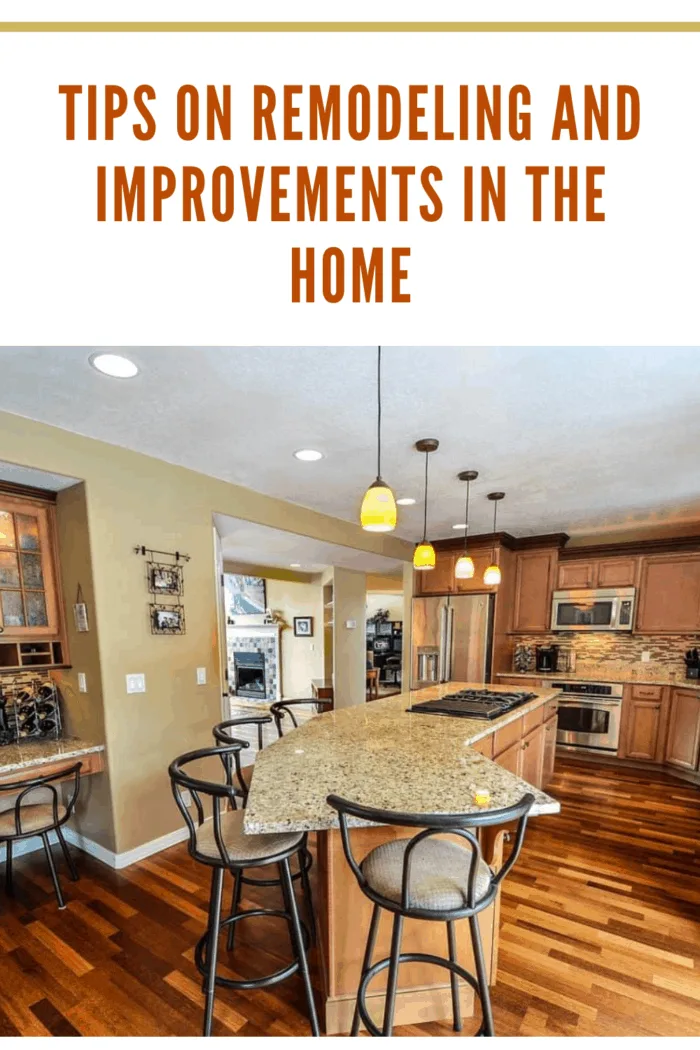Buying a new home and moving stuff using Hudson Movers and improving it or rebuilding some areas which you don’t like is a headache. Follow these six tips on remodeling and improvements in the home to add elegance and make your home more functional with more market appeal.
Knockdown your kitchen, your bathroom, or your garage with a dream: make your home more elegant or more functional.
But you do not want to invest in home improvements that do not offer a long-term benefit.
These are the six tips that can help your remodeling projects increase the resale value of your home.

Focus on the details of the remodeling
The architect who helps you should create a detailed floor plan to scale, including the places where the outlets will be.
You can even use a virtual planning tool from the National Kitchen and Bath Association to define exactly what you expect.
KBF Design Gallery has one fundamental goal in mind. To make your vision come to life.
Establish objectives and priorities for space, style, storage, functions, and features to be able to respect your budget and avoid waste.
A good rule to follow is to keep spending at less than 15 percent of your home’s market value.
Avoid prioritizing cost to the detriment of quality when making renovations
You may regret skimping on cheap paints, vinyl floors, or plastic pipes, as cheap materials deteriorate faster and reduce the resale value of your home.
This can result in a higher cost for the professionals to solve a fix made by yourself, instead of having hired a good contractor to do it from the beginning.
It is also useful to consult with interior and lighting designers, kitchen and bathroom planners, and other professionals to help you make convenient decisions in the long term.
Experts can advise you to avoid products that have a shorter shelf life or show proven deficiencies, such as unpolished granite that stains, splashing sinks, or paint for walls that can not be cleaned.
In addition, designers and contractors have discounts for belonging to the activity, so you can let them buy the materials.
Get several remodeling budgets
Once you have established your objectives and specifications, obtain multiple offers.
For these to be accurate, you will need to specify the specific type of floor, countertops, lights, and hardware you prefer.
Tour exhibition halls, lumberyards, and catalogs, and consult with friends and neighbors to put together your wish list.
Then, expose your expectations by creating a list of your selection of materials and products (including models, sizes, and colors) in your contract, which should break down materials and labor.
When choosing a contractor or designer, trust not the only word of mouth recommendations but also your local Better Business Bureau affiliate.
Communicate with several people and organizations and verify the speed to answer your calls, emails, and text messages.
This can be an indicator of how careful the contractor will be once he starts working on his project.
Ask to speak with previous clients to learn more about the quality of their work.
In addition, I would like to know if the specified materials were used, if the work deadlines were met, and if the conflicts that arose were resolved in a timely and appropriate manner.
Potential contractors must have commercial liability insurance and offer compensation to any subcontractor.
Obtain the remodeling permits required by the city
Obtaining the necessary permits, such as electricity, plumbing, and construction, can avoid conflicts with neighbors and obstacles when selling your home or updating your homeowner’s insurance coverage.
You may need a building permit if you plan to demolish a support wall, change the covered surface of your home, place a container on a public street, affect the sewer, build an aggregate, or make other significant changes.
In case you doubt if a permit is required, it is advisable to consult with the local government authorities before proceeding, instead of receiving a citation after the work has been paid and done.
Prepare to receive surprises when the remodeling begins
It is a good idea to add an additional 20 percent to the estimated costs of renewing your budget to cover unexpected emergencies.
This can prevent the shortage of money before the end of the project in case of an unexpected problem, such as the appearance of wood damaged by fungi or defective wiring.
Buying equipment and materials in the local market is a recommended tactic to reduce the project’s risk of delays.
Check the progress of the remodeling
You want to solve the problems before they appear, so take the time to control the team while you work.
Pay attention as the project progresses: are the floors warped? Are the sides of the cabinets uneven?
Are there any cracks in the window seals? Or do the walls have lumps?
If you notice that something is not as it should be, do not be afraid to comment and know that it is preferable to do it before it is too late.
The agreement with your contractor must include the materials and labor; however, it is also recommended that you read the agreements between the contractor and other specialists or subcontractors, such as plumbers, so as not to be surprised by additional expenses.
Never pay more than 30 percent of the total costs (to cover the materials), and reserve at least one-third of the payment until the remodeling is complete.
Resources:
